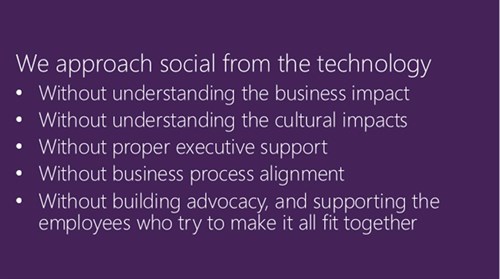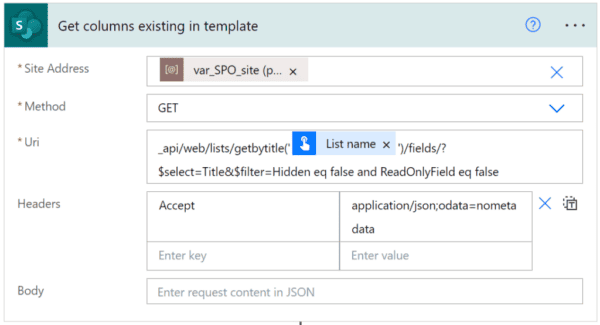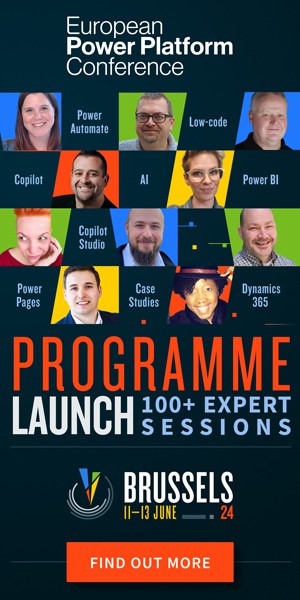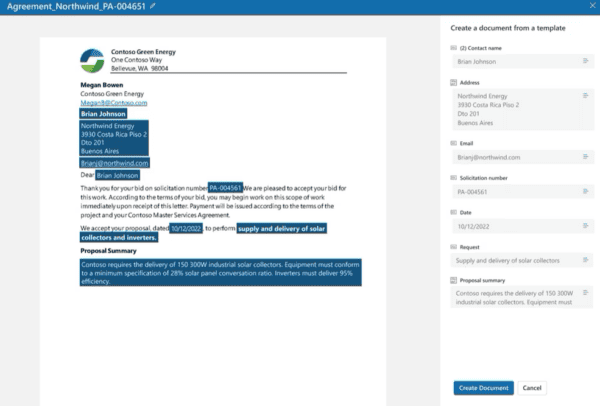At the SharePoint Connect 2014 conference (#SPcon14) in Amsterdam this month, I gave a keynote presentation on the very difficult proposition of integrating social into an organization. It’s a topic that I find myself writing about and talking with customers about more and more as organizations begin to seriously consider the implications of moving forward with some of Microsoft’s latest technology (Delve, Groups, inline social) being released within SharePoint Online and across the Office365 platform. I covered some of these same topics at the European SharePoint Conference (#ESPC14) in Barcelona in 2014 — and not surprisingly, most of the non-technical aspects of implementing a social strategy have come to the forefront within the community over the course of the year.
Organizations don’t need more content telling them they need to use social platforms — what they need is guidance on how to use them efficiently and effectively, with metrics and best practices for demonstrating the “social journey” and how to get a tangible return on investment (ROI) from these efforts. The problem, however, is that your metrics will be useless if you don’t have a clear understanding of what you’re trying to accomplish in the first place.
One slide from the Connect event, in particular, highlights the mistakes organizations make as they prepare to launch themselves into a social platform:

How we approach social from the technology
But there’s one important element missing from this list: our failure to move forward without proper measurements in place. Without a clear understanding of what it is we should be measuring, and then the consistent and accurate (as best as possible) capture of these measurements, we will not be able to see what has changed, what has been impacted, whether there is support and alignment.
The tendency is to throw platitudes at the problem, such as “We want more sales,” or “Our goal is to improve the customer experience.” Both true, and both completely and utterly impossible to track and measure in a responsible way. What tends to happen is that the marketing team takes this wisp of guidance and attempts to measure through common SEO metrics, such as visit counting, bounce rates, referring network, conversion rate by network, and social influence rankings.
These can add value, but until you have a clear goal in mind of what you are trying to accomplish, they may not help you demonstrate business value of social. For example, the tactics employed and the metrics used for a campaign to raise brand awareness would be different than an effort to increase your sales conversion rate. Each strategy will include a number of steps, each of which can be adjusted as you begin to see traffic.
How do you approach social with purpose? Understand your “call to action” and how to measure success. Some metrics to consider might include:
• Is the number increasing or decreasing week over week, month over month?
• Who was using the platform? Which groups? Which roles?
• How long did they spend reading or interacting with your content?
• Did they share your content (if you enable sharing), Like it, rate it, or leave a comment?
• Did they act on your call to action (was there a click-through action)?
• Did they review your profile, or browse through other content (your own, or other)?
• Does higher social activity correlate to more sharing? Other social activities? Completion of workflows?
This is just a place to start and hopefully got you thinking about what to measure within your own environment. You should take the time to discuss with your management team and stakeholders which measurements will be unique and meaningful to your organization, and will give you the best picture of what is working as you deploy your new social strategy.
Do you have an any questions on Christians article? If so please leave a comment below.
For more informative content on social from Christian download this ESPC14 keynote presentation on ‘Make Social Successful‘. Download presentation now>>

Christian Buckley
Christian Buckley is an Office365 MVP, Top 25 SharePoint Influencer, and Managing Director for GTconsult, a SharePoint consulting and managed services company with offices in the US and South Africa. Prior to GTconsult, Christian was a key part of two SharePoint ISV acquisitions, served as Chief Evangelist for Metalogix, and was member of the Microsoft team that launched SharePoint Online (now part of Office365). His entrepreneurial background includes several years running a regional consulting firm, co-founding a 501c3 non-profit (merged with a Lockheed non-profit), and co-founding and serving as CEO of a software company (acquired by Rational Software). Through these experiences, he worked with some of the world’s largest technology and manufacturing firms to design, build, and deploy social, collaboration, and supply chain solutions.
Christian is the co-author of two books on SharePoint and three books on software configuration management and defect tracking solutions, and regularly writes on the topics of collaboration technology, social computing, governance, and agile project management. He is an expert blogger for AIIM.org, and is very active in the SharePoint community, helping launch and organize SharePoint Saturday events across the western United States. Christian sits on the boards of three non-profits and regularly provides pro bono help around marketing and business development to entrepreneurs and startups.











